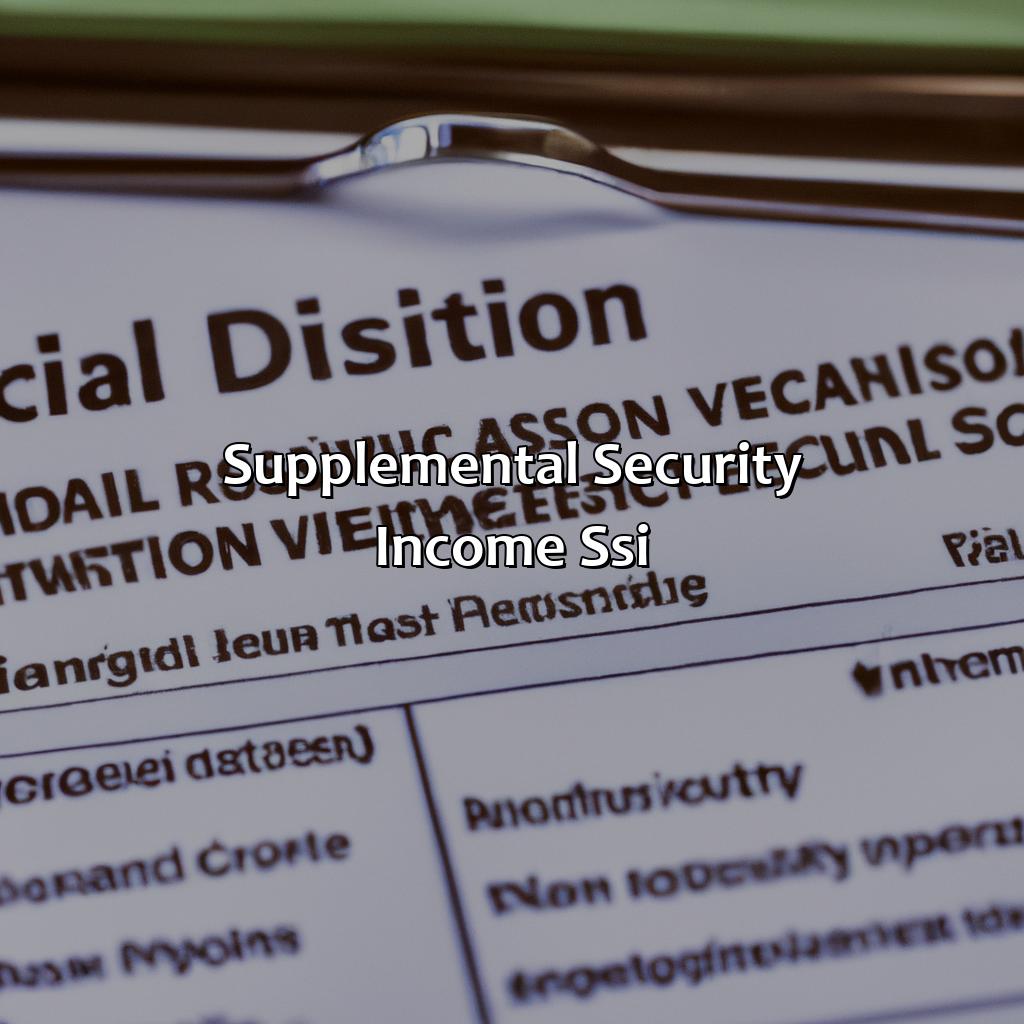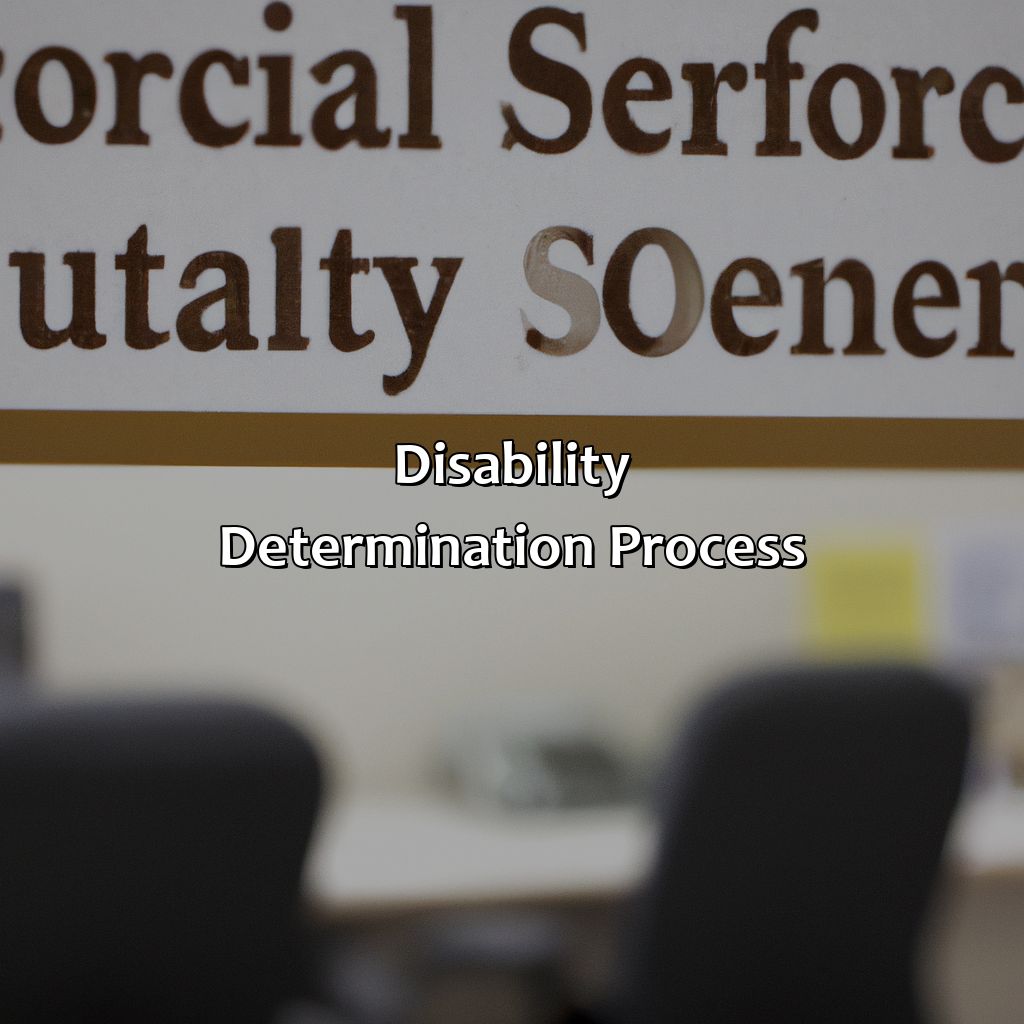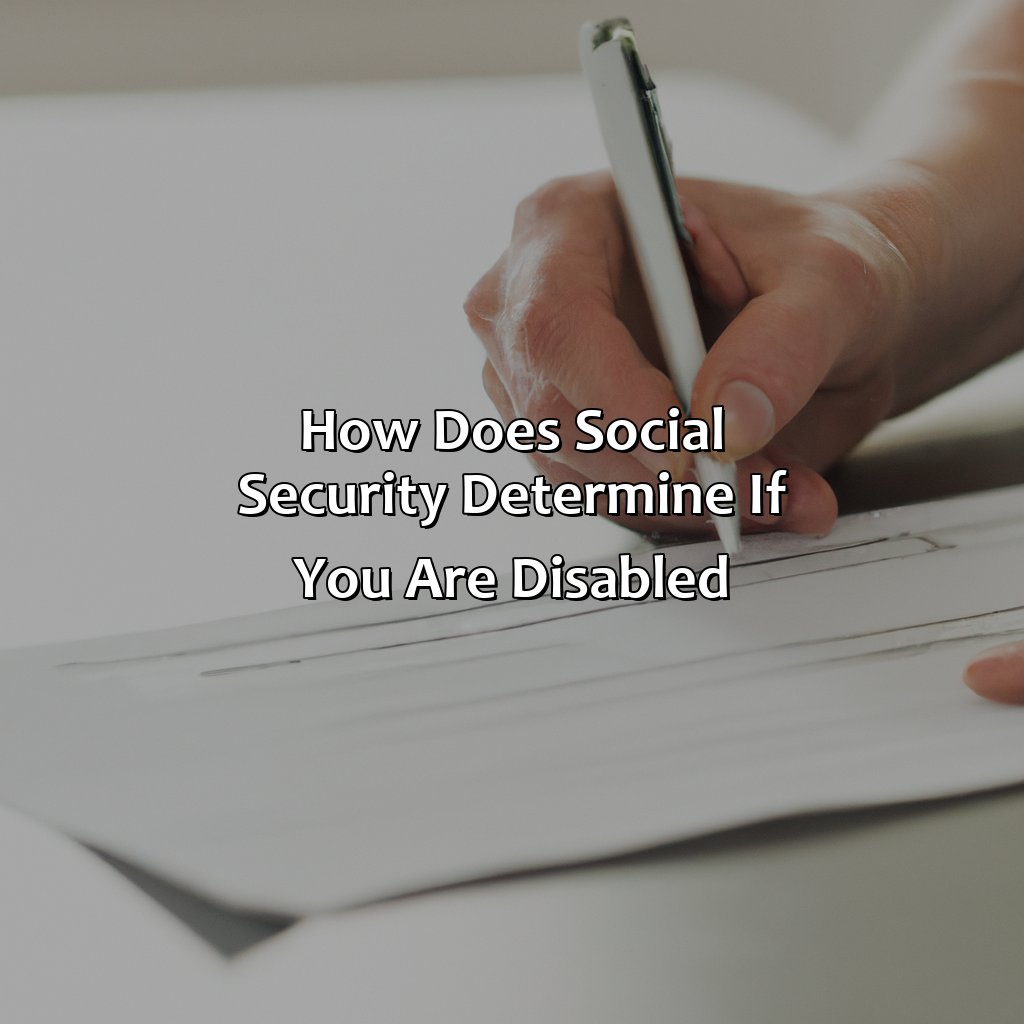How Does Social Security Determine If You Are Disabled?
Key Takeaway:
- Social Security Disability Insurance (SSDI) eligibility requirements include having a medical condition that prevents you from working, having earned enough work credits, and meeting certain age and citizenship criteria.
- Medical evidence needed to determine eligibility for SSDI includes clinical records, diagnostic test results, and statements from medical professionals regarding one’s ability to perform work-related activities.
- Supplemental Security Income (SSI) eligibility requirements involve having a medical condition that prevents you from working and meeting financial criteria, including having limited income and resources.
- The Disability determination process includes an initial application, reconsideration, Administrative Law Judge (ALJ) hearing, Appeals Council review, and federal court lawsuit.
- At each level of the disability determination process, the evidence presented is reviewed to determine the applicant’s eligibility for disability benefits.
- It is important to seek the help of a qualified disability representative or attorney when applying for disability benefits as they can help navigate the complex application process and increase the chances for a successful outcome.
Are you disabled and need help from social security? You may be uncertain how Social Security determines disability. This article will outline the criteria used to make such decisions so you can understand your rights.
Social Security Disability Insurance (SSDI)
Do you want to know if you’re eligible for Social Security Disability Insurance (SSDI)? To find out, Social Security will assess if you meet their criteria for disability. You’ll have to submit medical evidence that backs up your claim. Here’s what you need to know: the eligibility requirements and the medical evidence needed for Social Security to determine if you can get SSDI and financial help.

Image credits: retiregenz.com by David Woodhock
Eligibility requirements
To qualify for Social Security Disability Insurance (SSDI), a person must have a physical or mental impairment that prevents them from engaging in substantial gainful activity. Additionally, the condition must be expected to last at least one year or result in death.
The Social Security Administration uses a five-step process to determine if someone is disabled, including evaluating their work history, medical evidence, and ability to perform basic work activities.
The SSA evaluates the severity of the individual’s condition and considers whether it meets the criteria established by the SSA for qualifying as a disability. For example, if an individual has difficulty standing due to chronic pain, but their medical records do not indicate that they meet the medical listing criteria for this impairment, then they may not be considered disabled by SSA standards.
It is also important to note that individuals applying for SSDI must have earned enough work credits through previous employment. The number of work credits required depends on several factors such as age and how long the individual has been working.
According to U.S News & World Report, approximately 70% of SSDI claims are initially denied. However, many applicants are successful upon appeal with the help of an experienced attorney or representative.
Looks like getting a doctor’s note just won’t cut it anymore – you might need to bring in a personal injury lawyer to prove your disability to the government.
Medical evidence needed
When applying for Social Security Disability Insurance (SSDI), medical evidence is necessary to prove disability. This evidence includes medical records, doctor’s notes, test results, and any other relevant documents. It must show that the disability has lasted or will last at least 12 months and prevents you from working.
Additionally, the medical evidence should demonstrate how your condition limits your functionality. This information includes physical limitations like walking or reaching as well as mental impairments such as memory loss or lack of concentration. The documentation should also outline any treatments you have undergone for your condition.
It is crucial to get as much medical evidence as possible, including recent examinations and reports that diagnose your condition. The more detailed and accurate the information presented in the medical records, the better your chances for approval.
Pro Tip: Keep a copy of all medical documents in an organized file to access them quickly whenever needed.
SSI– where the ‘S‘ stands for ‘supplemental‘, the ‘I‘ stands for ‘income‘, and the extra ‘S‘ is for ‘struggle to make ends meet‘.
Supplemental Security Income (SSI)
This section will look at the benefits of SSI and the eligibility requirements you need to meet to be eligible. Plus, we’ll go over the two subsections:
- Eligibility Requirements: this subsection will detail the medical and non-medical requirements you will need to meet, including age, disability, citizenship status, and income limitations.
- Financial Criteria: here, we’ll look at the various financial limitations, including income limits, resources, and living arrangements that you will need to meet to receive SSI benefits.
Get ready to explore them!

Image credits: retiregenz.com by Adam Duncun
Eligibility requirements
To qualify for Supplemental Security Income (SSI), an individual must meet the eligibility criteria that are determined based on their financial resources and disabilities. The Social Security Administration (SSA) uses a five-step evaluation process to determine if an individual is disabled or not. This process includes assessing their ability to perform substantial gainful activity, severity of the impairment, medical evidence, ability to perform previous work, and other factors that affect their ability to work.
Financial resources include income, assets, and support from others. To be eligible for SSI benefits, an individual’s income and assets must fall below certain limits specified by the SSA. Additionally, the type and severity of disability must pass a strict threshold determined by the SSA.
The SSA evaluates medical evidence such as medical records, doctor’s notes, and laboratory findings to assess the nature and extent of impairments. They also take into account both physical and mental impairments when evaluating disability claims.
It’s important to note that even with a severe impairment, an individual may still be able to perform some type of work activity. However, if they can’t do substantial gainful activity due to their disability status as per SSA assessment for at least 12 months; they may be eligible for SSI.
Pro Tip: It’s essential to provide clear documentation regarding your financial resources and medical records when applying for SSI benefits. Seek professional guidance from attorneys who specialize in these issues in case of any confusions or doubts regarding filing a claim with social security administration or need any help meeting requirements.
Money can’t buy happiness, but it sure is a factor when it comes to qualifying for SSI as a disabled individual.
Financial criteria
When evaluating someone’s eligibility for Supplemental Security Income (SSI), social security looks at a variety of factors, including financial criteria. This includes income, resources, and assets. Your income cannot exceed certain thresholds, and if you have too many assets or resources, you may not be eligible for SSI.
In addition to income and assets, social security also considers any financial support you receive from friends or family members when determining your eligibility for SSI. Whether it’s monetary gifts or loans that need to be repaid, these sources of support can affect your eligibility.
It’s important to note that while financial criteria are an important factor in determining SSI eligibility, they’re not the only consideration. Social security also evaluates medical evidence related to your disability to determine if you meet their definition of a disabled person.
If you are unsure if you meet the financial criteria for SSI or have concerns about how different types of income or support may affect your eligibility, we recommend consulting a qualified disability attorney for guidance on how best to proceed. They can help identify options for maximizing your benefits while ensuring compliance with social security regulations.
Being declared disabled by social security is like winning the lottery, except instead of money you get medical bills and a lifetime supply of paperwork.
Disability determination process
To learn how the Social Security Administration works out if you have a disability, you must go through the Disability Determination Process. To make it easier for you, let’s look at the stages:
- Initial application
- Reconsideration
- Administrative Law Judge (ALJ) hearing
- Appeals Council review
- Federal court lawsuit
This will help you understand the steps and possible outcomes.

Image credits: retiregenz.com by David Duncun
Initial application
When an individual applies for disability benefits, the Social Security Administration begins the process of evaluating their medical condition. This process is called the Preliminary Determination phase. During this phase, the SSA checks if the applicant meets non-medical requirements such as earning limits, employment status and citizenship. If all requirements are met, then a determination is made about whether their disability is severe enough to prevent them from working at their previous level. The Disability examiner retrieves all the medical records related to applicants’ conditions and reviews them thoroughly. They may ask for additional medical tests or clarification from doctors or claimant.
After collecting of requisite information on initial application, the next step would be to review various determinations made by an examiner in consultation with one or more physicians or doctors who served as consultants in specific medical fields required to understand details of applicants’ disability before deciding finally on individuals’ eligibility claims.
As an example of successful processing in its initial application stage during early 2020, a man with multiple documented health issues along with fibromyalgia, hypertension, and depression was able to demonstrate how his symptoms markedly restricted his ability to stand or sit for extended periods. Consequently he qualified eventually based on clinical information provided in his records matching SSA’s criteria for qualification standards while adhering strictly to program guidelines set for receipt of Financial incentives from Social Security Departments.
Why bother with reconsideration? It’s just like the first time, but with a slightly different shade of rejection.
Reconsideration
After the initial disability determination, if an individual is denied benefits, they have the option to request a redetermination. During this process, a different team of Social Security Administration (SSA) specialists will evaluate the claim and make a new decision. This is known as a Redetermination. The individual has 60 days from the date of their denial letter to file for reconsideration.
During Reconsideration, medical and other evidence presented regarding the claimant’s medical condition is reviewed by examiners not involved in the initial determination. Reconsiderations are conducted de novo, which means that SSA personnel review all evidence, even that considered at earlier stages of administrative review along with any updated or new medical evidence.
It is important to note that the likelihood of a successful outcome during Reconsideration is relatively low. In some cases, it may take years before an individual receives their full social security disability benefits.
However, it is essential to be persistent at every stage of the process and to keep up-to-date with any changes in regulations or policies that could affect your eligibility for benefits. At times, it can be disheartening when applications for disability benefits are initially denied; nonetheless, don’t give up hope! Keep fighting forward and apply again till you secure what’s rightfully deserved – Access To Disability Benefits!
There have been instances where individuals who had been initially denied benefits were finally approved after filing appeals multiple times.
Why do they call it an Administrative Law Judge hearing? Sounds like a fancy term for ‘let’s put the disabled under scrutiny’.
Administrative Law Judge (ALJ) hearing
During the Social Security disability determination process, an individual may have a hearing with an ALJ. This is a legal proceeding to evaluate the evidence and make a decision on the disability claim. The ALJ is an impartial decision-maker who presides over the hearing and reviews medical records along with testimony from the claimant and other witnesses.
At the ALJ hearing, the claimant has the opportunity to present their case for disability benefits to an independent arbiter. The ALJ will consider all of the medical evidence and other relevant information provided by the claimant in making a determination of eligibility for benefits. The hearing can be conducted in person or via video conference depending on location and accessibility.
Claimants should come prepared to answer questions during the hearing as it is a detailed examination of their medical condition(s) and how they impact daily living activities. It’s important to note that not every individual who applies for Social Security Disability benefits will have an ALJ Hearing.
According to socialsecurity.gov, “In 2020, administrative law judges issued more than 380,000 decisions at hearings held across 169 hearing offices throughout the United States.”
Getting denied disability benefits is like a rollercoaster ride – except instead of loops and drops, it’s just paperwork and appeals.
Appeals Council review
When an applicant is dissatisfied with the decision made during the disability determination process, a formal hearing can be requested. This legal forum enables them to establish their case and state why they feel they are wrongfully being denied benefits. An Administrative Law Judge (ALJ) is responsible for presiding over this hearing and after careful consideration of all the details presented, will make a final ruling on whether or not to grant benefits.
During the Appeals Council review, the ALJ’s decision will be closely examined by higher officials who oversee benefit entitlement determinations made by Social Security. They may overturn the ruling if they find that it does not adhere to company policies and deny someone’s claim even if it was granted at the ALJ level.
It is important to note that the Appeals Council review must be applied for within 60 days after receipt of Hearing Decision Rendered notice. If this deadline passes, then an applicant may have no other recourse than to start the entire process again from scratch.
One person who utilized this step during her application process was Amber. She was initially denied but felt strongly about her qualifications for disability benefits and requested a formal hearing. During that official review, she was successful in making her case and had her claim approved. However, during the Appeals Council review, it was determined that new evidence had arisen which discounted one of Amber’s previous medical diagnoses and as a result, her claim was ultimately denied.
Why settle for regular court when you can federal court it up like a disability determination process on steroids?
Federal court lawsuit
Social Security’s disability determination process can be challenged through a legal procedure known as litigation. In this process, an applicant or beneficiary dissatisfied with the Social Security Administration’s decision on their disability application may pursue a lawsuit against the agency in federal court.
During a federal court lawsuit, the case will be heard by an administrative law judge, if it has not been heard before. The plaintiff—the applicant or beneficiary—must show that the original decision denying their claim was incorrect and that they should have been approved for disability.
It is important to note that pursuing litigation against Social Security can be lengthy and expensive. It is recommended to seek legal aid from an experienced attorney in such cases.
Interestingly, according to a 2020 report by the Congressional Research Service, only a small percentage of denied applicants ultimately go on to file lawsuits against Social Security.
Therefore it is advised to provide accurate information while submitting your first application itself.
Five Facts About How Social Security Determines If You Are Disabled:
Social Security uses a five-step evaluation process to determine if a person is disabled. (Source: Social Security Administration)
The process considers factors such as the severity of the disability, the person’s ability to do past work, and their ability to adjust to other types of work. (Source: Social Security Administration)
Social Security may request medical records and additional information from a person’s healthcare providers to aid in the evaluation process. (Source: Social Security Administration)
The evaluation process may take several months to complete, and a person may be required to attend a disability hearing. (Source: Disability Secrets)
It is essential to complete all necessary forms accurately and provide all required documentation as missing information can delay or deny disability benefits. (Source: NOLO)
FAQs about How Does Social Security Determine If You Are Disabled?
How does Social Security determine if you are disabled?
Social Security determines if you are disabled by following a five-step sequential evaluation process:
- Are you currently working?
- Is your condition severe?
- Does your condition meet or equal a listed impairment?
- Can you perform your past relevant work?
- Can you perform any other work?
How does Social Security define “disability”?
Social Security defines “disability” as the inability to engage in any substantial gainful activity (SGA) by reason of any medically determinable physical or mental impairment(s) which can be expected to result in death or which has lasted or can be expected to last for a continuous period of not less than 12 months.
How does Social Security evaluate mental impairments?
Social Security evaluates mental impairments based on four criteria:
- Activities of daily living (ADLs)
- Social functioning
- Concentration, persistence, or pace
- Episodes of decompensation
How does Social Security gather medical evidence to determine disability?
Social Security gathers medical evidence using information from medical sources such as doctors, hospitals, clinics, and other medical professionals. Social Security may also request additional medical tests or exams or consult with medical experts.
What happens if I am denied disability benefits?
If you are denied disability benefits, you have the right to appeal the decision. You must file an appeal within 60 days of receiving the denial letter. The appeal process includes a hearing before an Administrative Law Judge.
How long does the disability determination process take?
The disability determination process can take several months to more than a year. The length of time depends on factors such as the complexity of your case, the amount of medical evidence available, and how quickly Social Security can gather the necessary information.
 Checkout this IRS Loophole
Checkout this IRS Loophole 
